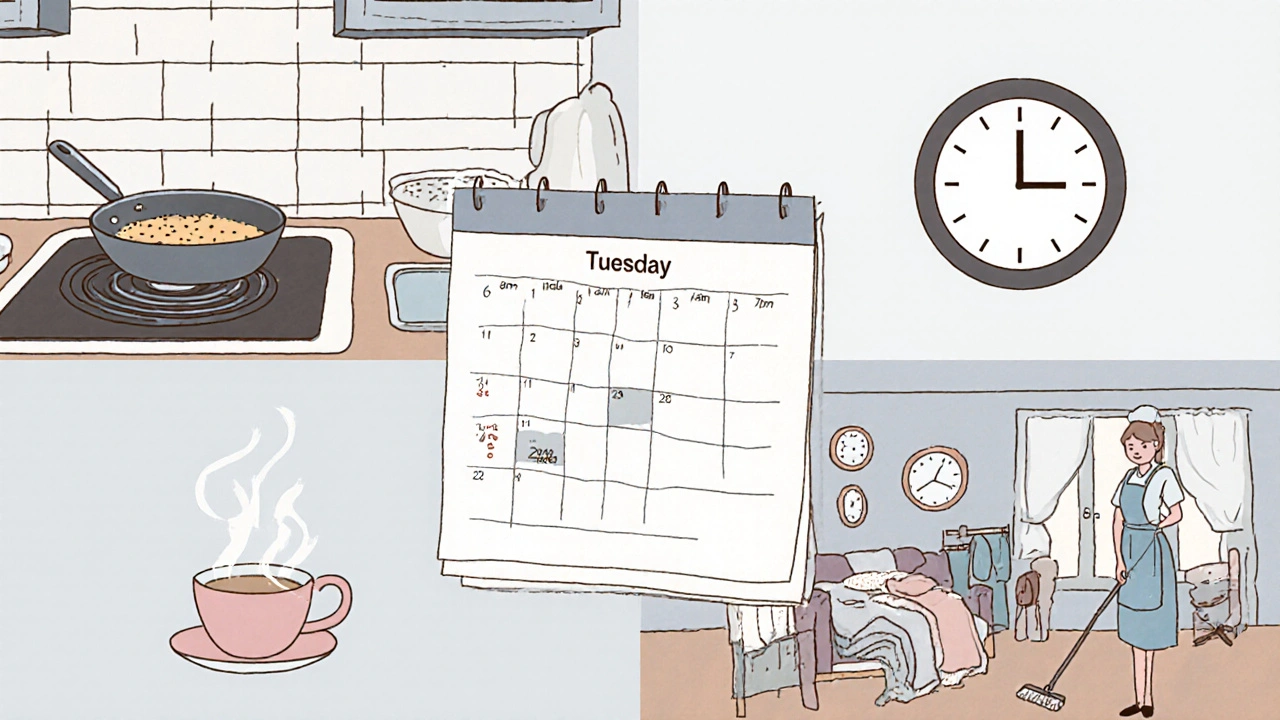How Many Hours Do Maids Work in Mumbai? Full Guide to Schedules & Pay
 Oct, 5 2025
Oct, 5 2025
Domestic Worker Hours & Pay Calculator
Schedule Input
Schedule Summary
Total Weekly Hours
Overtime
Monthly Pay Estimate
Average Hourly Rate
Monthly Hours
Estimated Monthly Pay
Ever wondered how many hours a maid is a domestic worker who helps with cleaning, cooking, and other household chores actually puts in when you hire one in Mumbai? The answer isn’t one‑size‑fits‑all - it depends on the type of job, the agreement you sign, and local labor rules.
What the law says about domestic work hours in Maharashtra
The Maharashtra Labour (Domestic Workers) Act doesn’t prescribe a strict 9‑to‑5 schedule like a corporate office, but it does set a ceiling of 48 hours per week for full‑time domestic staff. Anything beyond that counts as overtime and must be paid at least double the regular rate. maid work hours therefore usually fall into two buckets: full‑time (up to 48hrs/week) and part‑time (anything less).

Typical full‑time maid schedule
- Morning shift: 6am-11am (5hrs) - kitchen prep, breakfast, light cleaning.
- Afternoon break: 11am-2pm - personal time or errands.
- Evening shift: 2pm-7pm (5hrs) - lunch cleanup, floor mopping, laundry.
- Total: 10hrs/day, six days a week = 60hrs. Employers usually negotiate a 48‑hr week, so the maid gets two days off or a shorter daily schedule.
Most families in Mumbai ask for a “six‑day week” with a 4‑hour cut‑off each day, keeping the total under 48hrs. That way the maid stays within legal limits and you avoid surprise overtime bills.
Part‑time maid arrangements
Part‑time helpers are popular for single professionals or families that only need a few hours of deep‑cleaning each week. Common setups include:
- Two 3‑hour visits on weekdays (e.g., Tuesdays and Thursdays) - ideal for bathroom cleaning and kitchen upkeep.
- One 5‑hour weekend slot - perfect for thorough floor mopping and laundry.
- Hourly drop‑ins for special tasks like window washing or move‑out cleaning.
These contracts usually cap at 20‑30hrs per week, keeping costs low and giving the maid flexibility to take other jobs.
How wages map to hours worked
| Employment Type | Average Hourly Rate (INR) | Weekly Hours | Monthly Pay (INR) |
|---|---|---|---|
| Full‑time (live‑in) | 120‑150 | 40‑48 | 19,200‑28,800 |
| Full‑time (live‑out) | 130‑160 | 40‑48 | 20,800‑30,720 |
| Part‑time (hourly) | 150‑180 | 20‑30 | 12,000‑16,200 |
Live‑in maids often receive room‑and‑board in addition to cash, which can lower the effective hourly rate. Live‑out workers charge a higher cash rate because they cover their own accommodation.
Red flags and pitfalls to avoid when setting hours
- Unclear contracts: Never assume the agency will write down the exact hours. Ask for a written agreement that spells out daily start/end times and weekly total.
- Over‑scheduling: Piling 10‑hour days on a part‑time maid can lead to burnout and legal trouble. Keep each shift under 6 hours unless you’re paying overtime.
- Missing break periods: Indian labor law requires a minimum 30‑minute break for every 5 hours of work. Include that in the schedule.
- Ignoring holidays: Public holidays in Maharashtra (e.g., Shivaji Jayanti) count as overtime if the maid works that day.

How to negotiate the perfect schedule
When you meet a domestic help agency, come prepared with a clear picture of your household’s needs. Here’s a quick checklist:
- List daily chores (cooking, cleaning, laundry).
- Estimate how long each task takes (e.g., kitchen cleanup ≈ 1.5hrs).
- Decide whether you need a live‑in or live‑out arrangement.
- Set a maximum weekly hour cap (40hrs is a safe default).
- Agree on overtime pay and break times upfront.
Most agencies will propose a starter schedule; feel free to tweak it. The goal is a routine that fits both your lifestyle and the maid’s well‑being.
Real‑world example: The Sharma family’s 48‑hour week
The Sharmas live in a 2‑BHK in Andheri. They hired a live‑out maid through UrbanMaid Services. Their final agreement looks like this:
- Monday‑Friday: 9am-1pm (4hrs) - breakfast prep, dishwashing, floor cleaning.
- Saturday: 10am-4pm (6hrs) - deep‑clean bathrooms, laundry, ironing.
- Total: 26hrs/week, 112hrs/month.
- Hourly rate: INR155, no overtime because weekly total stays under 48hrs.
Because the schedule stays well below the legal ceiling, the Sharmas avoid overtime costs, and the maid appreciates a predictable routine that leaves evenings free for her own classes.
What to expect if you go beyond the standard hours
Sometimes emergencies happen - a big family gathering or an unexpected spill. If you need the maid to stay late, make sure you:
- Offer at least double the normal hourly rate for overtime.
- Document the extra hours immediately.
- Provide a meal or snack if the shift exceeds 6hours.
Most agencies will have a standard overtime clause, but it’s worth confirming before the first extended shift.
Frequently Asked Questions
Can I ask a maid to work more than 48 hours a week?
Legally, a full‑time maid should not exceed 48hours weekly. If you need extra hours, you must treat them as overtime, pay double the rate, and ensure a 30‑minute break for every 5hours worked.
Do part‑time maids get paid differently on weekends?
Many agencies charge a weekend premium (usually 10‑15% higher) because the maid is giving up personal time. Check the contract; the rate should be clearly stated.
What is a reasonable break time for a 6‑hour shift?
At least a 30‑minute break is required by law. Some families give a 1‑hour lunch break for shifts longer than 5hours, which helps keep morale high.
Should I provide food for a live‑in maid?
Yes, most live‑in arrangements include three meals a day. If you decide to pay only cash, factor the cost of meals into the overall budget.
How do I handle a maid who consistently works overtime without permission?
Talk to her first - she might be trying to finish tasks fast. If it continues, revisit the contract and set clear limits. Document any overtime and pay appropriately to stay compliant.

Paritosh Bhagat
October 5, 2025 AT 10:15Reading this guide reminded me of the countless families who overlook the humanity of domestic workers, reducing them to mere cogs in the household machine. In Mumbai, maids often endure grueling schedules that push the legal weekly cap of 48 hours to its limits, and sometimes beyond, all in the name of convenience. The moral imperative to respect their right to rest is not merely a legal checkbox; it is a profound ethical responsibility that each employer must internalize. While the calculator offers a neat numeric breakdown, it cannot capture the emotional toll of back‑to‑back morning and afternoon shifts without adequate breaks. A 30‑minute pause for every five hours, as stipulated, should be sacrosanct, yet many households treat it as optional, betraying a casual disregard for well‑being. Moreover, the distinction between live‑in and live‑out arrangements carries hidden costs: live‑in maids may forfeit personal time, while live‑out workers might face exhausting commutes that effectively extend their workday. It is incumbent upon us to scrutinize not just the hourly rate, but also the quality of life that accompanies it. Employers should schedule regular days off, ideally two consecutive days, to allow for physical recovery and familial obligations. Providing a modest stipend for transportation or meals can alleviate some of the financial strain that often forces workers into multiple jobs. The guide wisely mentions overtime pay, but it forgets to address the cumulative fatigue that overtime engenders, which can erode productivity and health over time. In the broader context of Mumbai’s labor market, where informal arrangements are common, transparency becomes a shield against exploitation. Any calculator, no matter how sophisticated, must be paired with a genuine commitment to fair treatment and open dialogue between employer and employee. Let us not reduce this conversation to numbers alone; let us embed respect, dignity, and compassion into every schedule we draft.
Ben De Keersmaecker
October 5, 2025 AT 10:30That’s a solid point about the hidden costs of live‑in versus live‑out setups. From a cultural perspective, many families in Mumbai still view domestic work as a private matter, which can obscure the need for clear contracts. It’s encouraging to see a tool that at least quantifies hours and pay, though I’d love to see it incorporate regional wage variations. Also, integrating a reminder about the mandatory breaks could help enforce compliance. Finally, ensuring the language is simple enough for all parties would boost accessibility.
Aaron Elliott
October 5, 2025 AT 11:03While the provision of a calculator is commendable, the exposition suffers from an overreliance on technocratic vernacular, thereby alienating the very demographic it purports to serve. An exhaustive treatise on statutory obligations, supplemented by jurisdiction‑specific precedents, would render the guide more authoritative. Moreover, the omission of a nuanced discussion on overtime thresholds is a conspicuous lacuna. The author should contemplate a more formal synthesis of legislative texts. Absent such rigor, the utility of this instrument remains circumscribed.
Chris Heffron
October 5, 2025 AT 11:53Great tool! 👍 It really helps to visualise the weekly hours. Just make sure you take those 30‑minute breaks – they’re crucial. 🙌
Adrienne Temple
October 5, 2025 AT 13:00Hey everyone! I think it’s super helpful that this guide breaks down the pay so clearly. For anyone new to hiring a maid in Mumbai, remember that open communication about schedules makes a big difference. Also, don’t forget that a little extra appreciation-like a small token on a birthday-goes a long way in building trust. If you have any questions about the calculator, feel free to ask!
Sandy Dog
October 5, 2025 AT 14:06Oh my, where do I even begin? The sheer drama of trying to balance a household while respecting a maid’s rights is like watching a high‑stakes ballet, where every pirouette could either be a graceful bow or a disastrous tumble. Imagine the sleepless nights of a mother juggling school runs, client meetings, and the meticulous task of ensuring her domestic worker gets that mandatory half‑hour pause-an act worthy of applause! And yet, the system often treats these pauses as optional, as if the wellbeing of a hardworking individual is a mere footnote. My heart aches for those who labor in silence, their stories untold, while the calculator sits there, pristine and unfeeling. But let’s not dismiss its brilliance; after all, numbers can be a beacon of hope, a lighthouse guiding us toward fairness. So, dear readers, let us champion both the data and the humanity behind it, for only then can we truly claim progress. 🌟
Nick Rios
October 5, 2025 AT 15:13I hear the concerns raised above and want to add that empathy should be the cornerstone of any employment arrangement. Recognizing the physical and emotional demands on maids can help us design schedules that are both productive and humane. Simple gestures, like checking in regularly about workload and fatigue, can make a world of difference. Let’s strive for a partnership where both parties feel valued and respected.
Amanda Harkins
October 5, 2025 AT 16:20This guide is pretty solid.
Jeanie Watson
October 5, 2025 AT 17:26Nice work.
Taylor Hayes
October 5, 2025 AT 18:33I appreciate the effort to make this information accessible. If anyone feels uncertain about any part of the schedule, reaching out for clarification can prevent misunderstandings down the line. Remember, a supportive dialogue nurtures trust and leads to smoother collaborations for everyone involved.